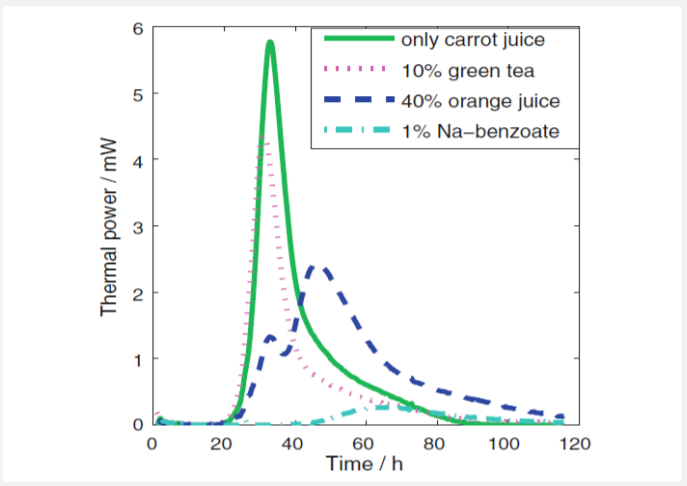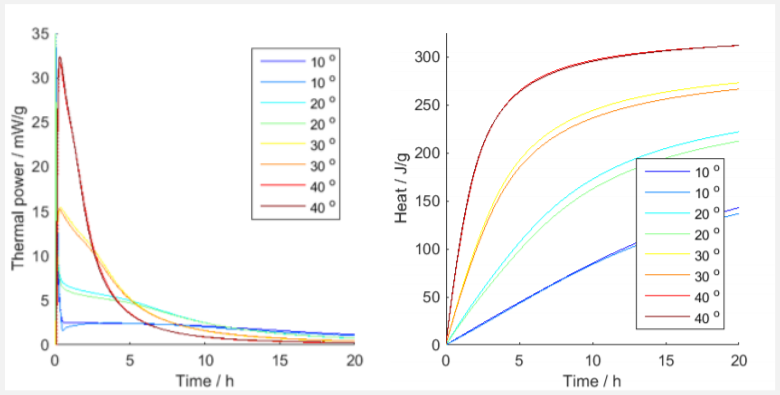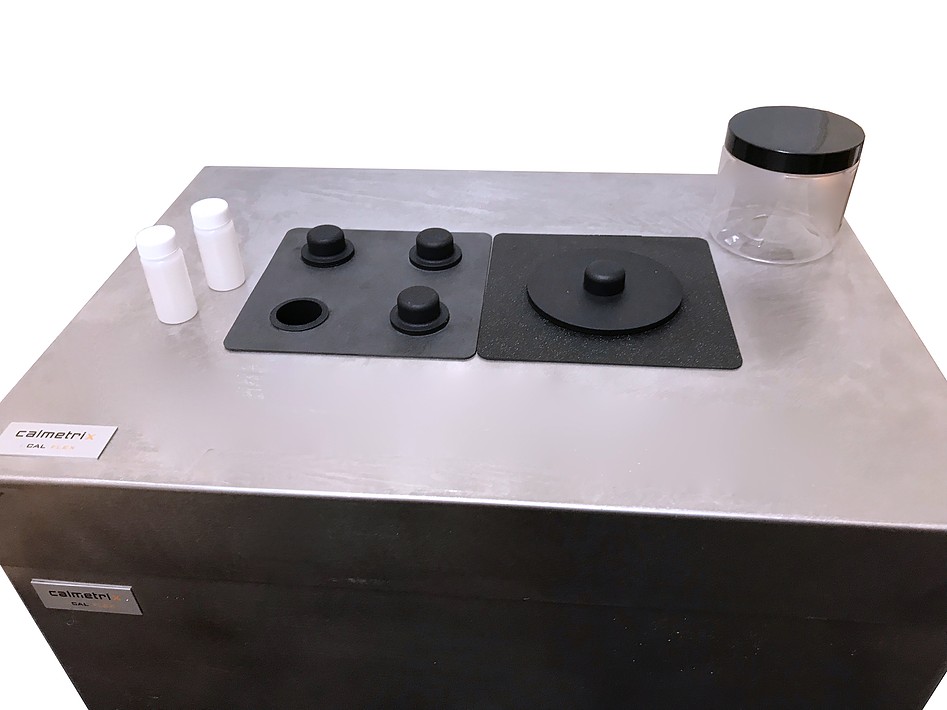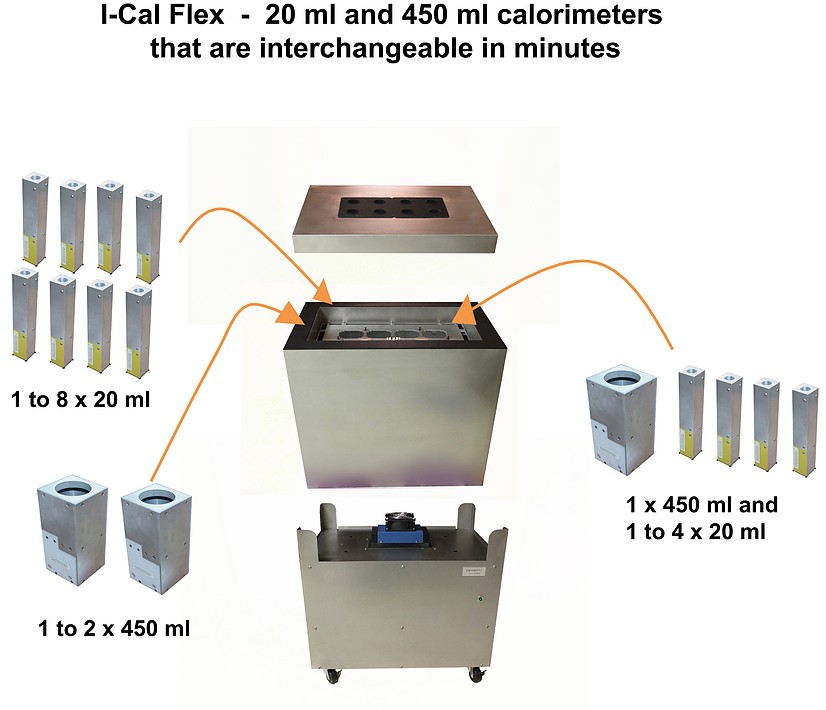The I-Cal Flex’s flexible design lets users change seamlessly between several plug and play configurations. Testing can be conducted on up to 8 sample cells of 20 ml capacity, or up to 2 sample cells of 450 ml capacity, or alternatively a hybrid configuration for simultaneous testing of up to 4 cells with 20 ml capacity and one cell with 450 ml capacity. I-Cal Flex covers all types of samples from homogeneous to inhomogeneous in such diverse fields of application as microbiology, pharmaceuticals, cosmetics, food items, with sample vials suitable for large inhomogeneous samples such as soils, fruits, meats and other food items, chemicals, minerals, insects, crops and seeds, sludges, cement or concrete, and many others.
The twin calorimeter cells in the I-Cal Flex are calibrated through individual internally fixed calibration heaters. All cells are well isolated from one another by a wide air gap, which confers unparalleled precision and stability by completely eliminating any crosstalk. The high precision thermostat spans a temperature range from 2 °C to 90 °C, with a stability of +/- 0.005 °C over an indefinite time period, thereby enabling very long-term testing over periods of several weeks or months. The I-Cal Flex's baseline drift and noise levels are the best in its category. Optional accessories are available for internal stirring and injection of liquids, gas circulation and the introduction of sensors for other parameters such as pH, humidity, etc.
Applications:
The I-Cal Flex can be used in virtually any field of application pertaining to the Life Sciences or Material Science, in Research and Development, as well as Quality Control of industrial materials and processes, including:
-
Examples from the Life Sciences:
-
food spoilage and shelf life
-
seed germination
-
sewage sludge digestion
-
crop diseases
-
antibacterial coatings
-
fermentation processes
-
composting
-
metabolic response of plants
-
respiration of insects
-
About Isothermal Calorimetry in Life Sciences.
Life Sciences study living things and their life processes, as well as how they are affected by their environment. Isothermal calorimetry is a powerful tool to study such processes, by measuring the heat released by biological or chemical activity in an active sample while the surrounding temperature is maintained constant. The Calmetrix I-Cal Flex is an isothermal calorimeter that combines a high degree of flexibility, outstanding performance and ease of use.

Case Study: Effectiveness of preservatives
In industry and academia, it is common to assess the influence of a given additive on the activity of microorganisms, for example when developing preservatives or additions of antimicrobial compounds. isothermal calorimetry offers a much less laborious than e.g. plate counts way to quickly assess the efficiency of preservatives. A single sample with each preservative to be tested is enough for the calorimeter to measure microbial activity continuously and in real time. One can rapidly and clearly assess the onset of microbial activity in each sample. In this example, the addition of green tea reduces microbial activity to some degree, but does not increase shelf life. A blend with orange juice produces a similar effect. Only the sodium benzoate increases the shelf life from 20 hours without any preservative to more than 45 hours.
-
Examples from the Material Sciences:
-
drying of adhesives and paints
-
curing of polymers
-
battery leakage
-
oxidation of metals
-
alkaline hydrolisis of organic materials building materials
-
cement hydration
-
stability of packaging materials
-
About Isothermal Calorimetry in Material Science.
Material Science studies the composition, properties and applications of materials used in every aspect of human activity. Isothermal calorimetry measures the heat released by any chemical or physical reaction in an active sample while the surrounding temperature is maintained constant. Isothermal calorimeters are different and complementary to other commonly used types of calorimeters, such as differential scanning calorimeters, where the temperature is gradually increased during a test to study phase changes on a very small sample.

Example: Curing of a polyurethane sealant
This example illustrates the measurement of a polymerization reaction in an isothermal calorimeter, in this case the curing of a polyurethane sealant. The graphs show the thermal power (left) and total heat of reaction (right) of the reaction at different ambient temperatures, from 10°C to 40°C. The thermal power is a measurement of the kinetics of the reaction, directly proportional to the rate at which monomers convert into the polymer. The heat is proportional to the total progression of the reaction. Such kinetics and progressions can be followed in real time and minute by minute. Test results are easily interpreted to assess the influence of temperature on the efficiency of polymerization.
When to consider an I-Cal Flex:
I-Cal Flex is an ideal isothermal calorimeter for advanced research applications that require a very high sensitivity or stability over long testing periods, or testing in low isothermal temperature conditions, or when applications span both homogeneous and heterogeneous samples in multiple applications.

The I-Cal Flex’s flexible sample cell configuration lets users choose between up to 8 sample cells of 20 ml capacity for homogeneous food items, or up to 2 sample cells of 450 ml capacity, with sample vials suitable for large inhomogeneous samples such as soils, fruits, meats and other food items, minerals, small insects, crops and seeds, sludges, cement or concrete, and others. The I-Cal Flex's isothermal temperature can be set as low as 2°C and it offers the best precision and baseline stability in its class.
Applications: a vast selection from the Materials and LIfe Sciences, including Food Science, Microbiology, Agricultural Science, Polymers, Soil Science, Marine Life, Environmental Science, etc.

